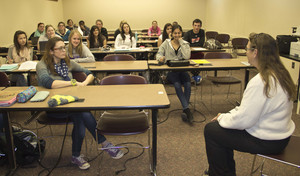Role play exercise helps future social workers think on their feet

The common expression that we learn by doing was evident this semester, when students in an introductory social work class taught by Rich Kenney, assistant professor in counseling, psychology and social work, were thrust into the role that they will one day fill as professional social workers – that of assisting a client.
Student Jen Kallunki said there were significant differences between interacting with role play actors and one client who was portraying herself - a widow working full-time and taking care of her mentally retarded adult son.
“It was causing her a lot of stress and she felt overwhelmed. She had been married to her husband for over 20 years, but hadn't even had a chance to properly mourn him following his unexpected death. That ‘mock’ client interview felt a lot more serious, and we had to be more aware of what questions we were asking and our tone. Consequently, she was asked a lot fewer questions,” Kallunki said.
Connie Moore said, "I enjoyed being a part of the role playing experience for the class and also found it very informative for me. I think answering the students’ questions made me think a lot about my situation and I felt much better just being able to answer their questions. My role playing was easy because it is my real life each and every day.”
Valerie Rahrs, a CSC 2009 graduate from the social work program, is the Director of Norwesca Camp and Retreat Center, one of three United Methodist church camps in Nebraska. She has worked there since 2010 and been the director since July of 2011.
Her role play character was an unemployed mother of four children under the age of five. The character did not have reliable transportation or adequate medication for children. The family was enrolled in Supplemental Nutrition Assistance Program and the mother was trading the food for cash.
She snapped defensively at one of the student's questions during the role play.
“Clients can be defensive because they don’t see a way out. I worked the front line in Gering with court ordered clients. The interactions between a client and a social worker are like a dance. The role playing is a good idea. It gives these up and coming social workers an idea of who they could be working with,” Rahrs said.
Rahrs commented that she noticed the students transitioned from surface questions to deeper questions that caused her to become more reflective.
“I think it’s a great practice for thinking on their feet. They show great promise. I would do it again,” she said.
Kenney said, ”When students become engaged in the learning process, they take ownership of their education. That was evident with these particular students.”
He said the students were asked to assess each situation then determine additional client needs and formulate an action plan.
“The client role-play set the tone for the entire semester. In a follow-up survey, the students overwhelmingly singled out this exercise as one they considered to be an extremely effective way of learning,” he said.
He noted that the students have developed confidence in their individual strengths and have worked cohesively as a team in assisting each of the clients that have visited the classroom.
Kenney said, “I strongly believe that in order to learn, students must play an active role. The client role-plays have resulted in an active, healthy, learning environment, one I will continue to foster in the semesters to come.”
Category: Campus News, Social Work
